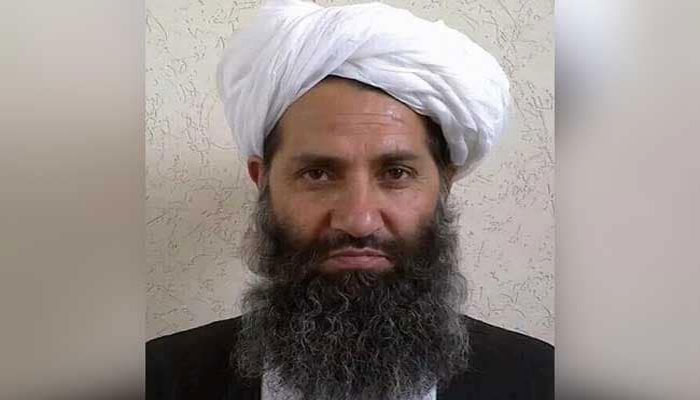Taliban to grant Supreme Leader Haibatullah Caliph status
With the collapse of the Ghani regime the Afghan Taliban have sought to fill the void in Kabul consolidating renewed control of Afghanistan. Their rank and file have started calling the Supreme Leader, Amir ul Mominin Haibatullah Akhunzada, as Caliph (Khalifa), it has been reliably learnt.
Afghanistan may be just days away from witnessing the status of the Taliban's leader raised to a caliph by their Council of Guidance (Nigabaan Shora).
It is a symbolic change and coincides with their re-getting of the state. The exact timing of the formal designation is linked to the consolidation of their renewed grip on the entire Afghanistan.
The primary aim behind this move is twofold: first, to prevent Daesh from designating an alternative caliph after the loss of Abu Bakar Al Baghdadi Al-Qurayshi, and the second is to prevent – as the conspiracy theory goes – the Turkish leaders aspiring to have a caliph post-2023 while they will be out of obligations of humiliating treaties they acted the post 1st World War.
Centuries ago, when Central Asian Tatars defeated the Abbasiyah rulers in Baghdad, one of the princes fled to Egypt and Abbasiyah continued ceremonially after the 11th century. Later Salman (the first), Sultan of the Ottoman Sultanate, went and brought the prince to Istanbul.
Then in a Friday sermon made him agree to confer the authority on Sultan as the next caliph. So the legend is that the Arabs through this Prince recognised the non-Quraishi Ottoman Sultan as caliph from onwards.
The Arab world established two precedents: a) that caliph belongs to them i.e. only the Quraysh tribe owned descendance in form of Abbasiyah dynasty, and b) it can be conferred on non-Quraysh as well – though many disagree with this narration.
Now one conspiracy theory suggests that the Turkish rulers may restore this precedent of caliph in 2023, as the Ottoman Sultan was himself a caliph.
Notwithstanding, there has to be a third non-Quraysh aspiring caliph who has to take the Arab tribes on his side by enabling Quraysh to delegate the authority of caliph. It may be recalled that the Daesh caliph in Syria and Iraq was Abu Bakar Al Baghdadi Al-Qurayshi tracing his lineage to the Prophet (PBUH) and who is no more. Hence there is a vacuum.
This is why the Taliban want their spiritual head as their caliph. Since Daesh is in the process of reviving after the complete US withdrawal, the Taliban want to preempt their ideological and physical revival. It serves a practical purpose: If a Taliban soldier thinks that caliph belongs to Daesh and not his movement, then it creates doubt in his mind and may switch allegiance to Daesh. In that case, the Taliban may not be able to contain Daesh in Afghanistan.
As far as having to play a role in the Muslim world by the Taliban caliph, the likely contribution is more symbolic than substantive given the limits, nation states and balance of power in international relations imposed on another weak state like Afghanistan.
For now, the Taliban having Haibatullah Akhundzada as their caliph will neutralise both the Daesh's potential bid for their caliph and potential Turkish aspirations on this behalf.
Jan Achakzai is a geopolitical analyst, a politician from Balochistan and an ex-adviser to the Balochistan Government on media and strategic communication.
He remained associated with BBC World Service. He is also Chairman of the Institute of New Horizons (INH) & Balochistan.
He tweets @Jan_Achakzai
-
 Princess Kate Talks About 'hard Conversations' With Kids Amid Andrew Drama
Princess Kate Talks About 'hard Conversations' With Kids Amid Andrew Drama -
 Prince William Mocked For Being ‘most Reluctant’ King-in-waiting
Prince William Mocked For Being ‘most Reluctant’ King-in-waiting -
 Prince William Makes Rare Admission After Andrew Arrest
Prince William Makes Rare Admission After Andrew Arrest -
 ‘Got A Lot Of People Gunning For Me’: Trump Makes First Comments On Mar-a-Lago Intruder
‘Got A Lot Of People Gunning For Me’: Trump Makes First Comments On Mar-a-Lago Intruder -
 What Countries Have A Say In Andrew Removal From Line Of Succession?
What Countries Have A Say In Andrew Removal From Line Of Succession? -
 How Did Luci4 Die? Police Probes 'BodyPartz' Sudden 'suspicious' Death
How Did Luci4 Die? Police Probes 'BodyPartz' Sudden 'suspicious' Death -
 King Charles Criticized By Princess Anne Over Andrew Drama
King Charles Criticized By Princess Anne Over Andrew Drama -
 Hailee Steinfeld Details Preparations Ahead Of Welcoming First Kid With Josh Allen
Hailee Steinfeld Details Preparations Ahead Of Welcoming First Kid With Josh Allen -
 Shocking Details Revealed About Gunman 'Austin Tucker' Shot Dead At Trump’s Resort 'Mar-a-Lago'
Shocking Details Revealed About Gunman 'Austin Tucker' Shot Dead At Trump’s Resort 'Mar-a-Lago' -
 Queen Camilla Meets Gisèle Pelicot, Sends Powerful Message To Victims As Andrew's Scandal Deepens
Queen Camilla Meets Gisèle Pelicot, Sends Powerful Message To Victims As Andrew's Scandal Deepens -
 Cancer-stricken King Charles At Breaking Point?
Cancer-stricken King Charles At Breaking Point? -
 Andrew Leaves King Charles No More Moves To Play: ‘Can’t Just Say We Got Nothing’
Andrew Leaves King Charles No More Moves To Play: ‘Can’t Just Say We Got Nothing’ -
 Sterling K. Brown Explains How Sharing His Kids' Photos On Social Media Can Keep Them Safe
Sterling K. Brown Explains How Sharing His Kids' Photos On Social Media Can Keep Them Safe -
 Keir Starmer Gives Major Advise To King Charles Amid Andrew Scandal
Keir Starmer Gives Major Advise To King Charles Amid Andrew Scandal -
 Nick Reiner Pleads Not Guilty In Famous Parents' Double Murder Which Shocked The World
Nick Reiner Pleads Not Guilty In Famous Parents' Double Murder Which Shocked The World -
 Benicio Del Toro On Losing Mom In Chldhood: 'I’m Still Dealing With It'
Benicio Del Toro On Losing Mom In Chldhood: 'I’m Still Dealing With It'




